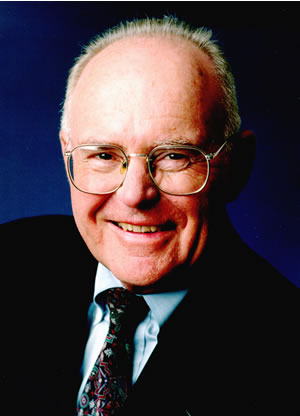 For over forty years Moore’s Law has stood to be correct. It’s now being questioned as to whether it will continue.
For over forty years Moore’s Law has stood to be correct. It’s now being questioned as to whether it will continue.
Named after co-founder of Intel, Gordon Moore (pictured), Moore’s Law stated that the number of transistors that can be placed on an integrated circuit doubles every two years.
Len Jelinek, director and chief analyst, semiconductor manufacturing, for research company iSuppli, has raised the flag that given the economics of the chip business, it could well come to an end, in around 2014.
Jelinek thinks that “The usable limit for semiconductor process technology will be reached when chip process geometries shrink to be smaller than 20 nanometers (nm), to 18nm nodes.” It’s currently at 65nm.
When reaching the 18-20 nm level, Jelinek theory is that “the industry will start getting to the point where semiconductor manufacturing tools are too expensive to depreciate with volume production, i.e., their costs will be so high, that the value of their lifetime productivity can never justify it.”
Initially it was important to Intel to push the capabilities and complexities of their chips, in an effort to keep a gap between them and the competition. Jelinek thinks this relentless move by the chip business is slowing down, saying “Now the question is how to make money by sustaining a specific node.”
Comments
3 responses to “The Future Of Moore’s Law Questioned”
As Karim Sadjadpour pointed out in an interview on the PBS Newshour on Monday night, it is not easy for the regime in Tehran to discredit all of the supporters of the opposition, since several of them, including Mir Hussein Moussavi, have “impeccable revolutionary credentials.” Here is video of that interview, in which Gary Sick, a former member of the National Security Council, also comments on the power struggle now taking place in Iran.
Errr Tatang … thanks for the comment, but don’t quite understand the relevance to our story.
Have removed your link to a site about mp3 speaker, for similar reasons to above.
Has personal hardship now become the latest spammers tool?
Any votes for finding a word that exceeds cynical?
I would agree with the end coming near not because of the chips becoming more expensive, but rather the way in which the company is using the surroundings of the chip. The chip is less important than it was and I would say this could be more evident prior to 2014. The computers are becoming more and more disposable and the life-span of them is only getting shorter based on the capitalist ideas of the makers. I have noticed this living through the advancements of the Apple Computers. The technology is only released when the company deems the product as most viable to increase the buying of replacements. I wish more companies would do things like Google and forget about the profits and think about the good of the technology and how it can help the people-